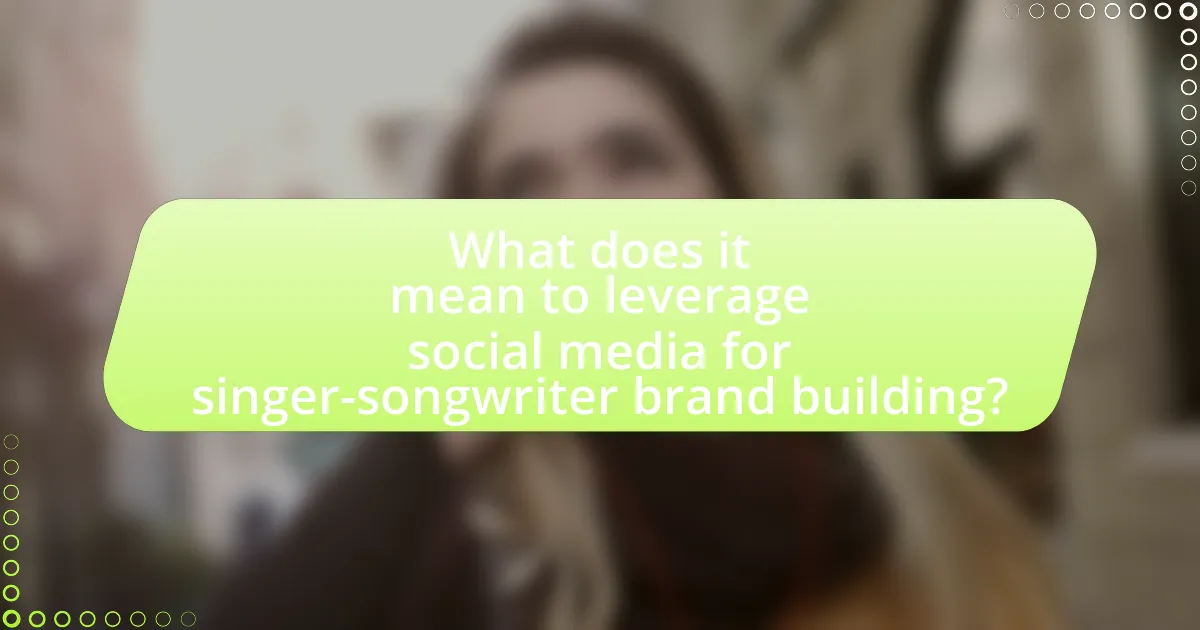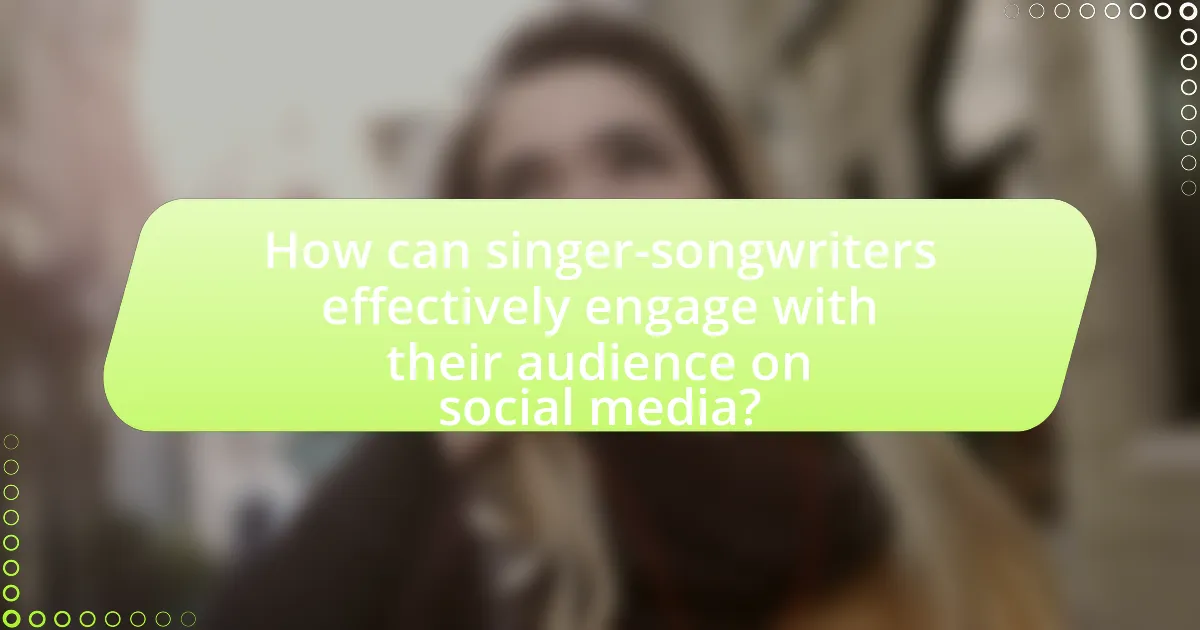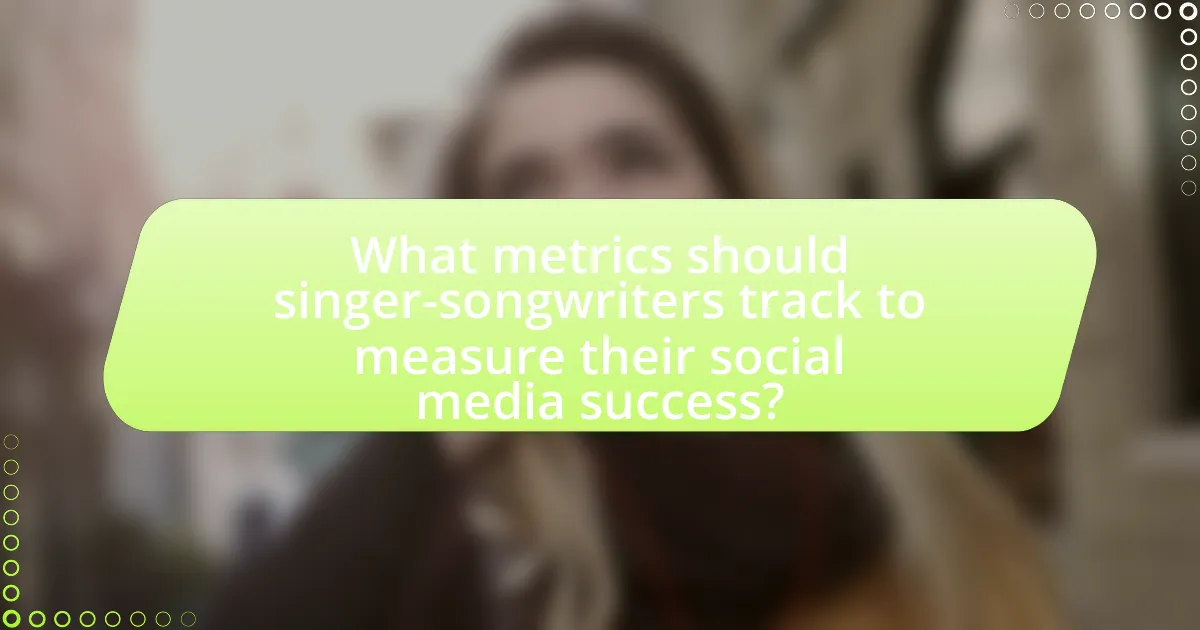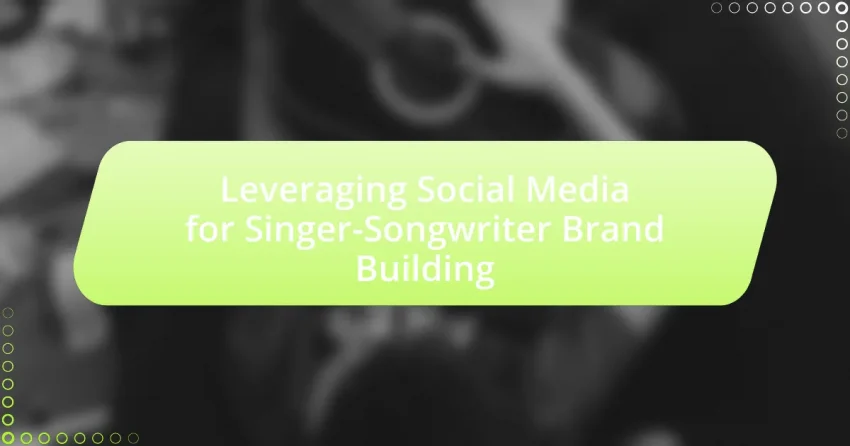Leveraging social media for singer-songwriter brand building involves utilizing platforms such as Instagram, Facebook, and TikTok to create a recognizable personal brand and connect with audiences. The article outlines how these platforms enhance visibility, facilitate engagement, and cater to various demographics, emphasizing the importance of brand building in a competitive music industry. Key strategies for effective brand development include consistent content sharing, authentic engagement, and collaborations with other artists or influencers. Additionally, the article discusses the significance of tracking engagement metrics and utilizing data analysis to refine social media strategies, ultimately fostering a loyal fan base and driving career growth.

What does it mean to leverage social media for singer-songwriter brand building?
Leveraging social media for singer-songwriter brand building means utilizing platforms like Instagram, Facebook, and TikTok to create a recognizable and engaging personal brand. This approach allows artists to connect directly with their audience, share their music, and showcase their personality, which is essential for building a loyal fan base. According to a 2021 survey by the Music Industry Research Association, 70% of musicians reported that social media significantly contributed to their audience growth and engagement. By consistently posting content, interacting with fans, and promoting their music, singer-songwriters can enhance their visibility and establish a strong brand identity in a competitive industry.
How can social media platforms enhance a singer-songwriter’s visibility?
Social media platforms enhance a singer-songwriter’s visibility by providing direct access to a global audience and facilitating engagement with fans. These platforms allow artists to share their music, behind-the-scenes content, and personal stories, which fosters a deeper connection with listeners. For instance, according to a 2021 report by the International Federation of the Phonographic Industry, 80% of music consumers discover new artists through social media. Additionally, algorithms on platforms like Instagram and TikTok promote content based on user interaction, increasing the likelihood of a singer-songwriter’s work being seen by potential fans. This targeted exposure can lead to increased streaming numbers, concert attendance, and overall brand growth.
What are the key social media platforms for singer-songwriters?
The key social media platforms for singer-songwriters are Instagram, TikTok, Facebook, and YouTube. Instagram allows artists to share visual content and engage with fans through stories and posts, making it essential for brand building. TikTok has rapidly gained popularity among musicians for its viral potential, enabling singer-songwriters to showcase their music in short, engaging videos. Facebook remains a vital platform for community building and event promotion, while YouTube serves as a primary channel for music videos and longer-form content, helping artists reach wider audiences. These platforms collectively enhance visibility and fan interaction, crucial for a singer-songwriter’s success in the digital age.
How do different platforms cater to various audience demographics?
Different platforms cater to various audience demographics by tailoring content formats, engagement strategies, and advertising options to meet the preferences of specific user groups. For instance, Instagram primarily attracts younger audiences with its visual-centric approach, utilizing stories and reels to engage users, while Facebook appeals to a broader age range by offering diverse content types, including groups and events. Additionally, TikTok focuses on short, entertaining videos that resonate with Gen Z, leveraging trends and challenges to foster community interaction. According to a Pew Research Center study, 71% of teens use TikTok, highlighting its effectiveness in reaching younger demographics. Thus, each platform’s unique features and user engagement methods align with the interests and behaviors of distinct audience segments.
Why is brand building important for singer-songwriters?
Brand building is crucial for singer-songwriters because it establishes their unique identity and fosters a loyal fan base. A strong brand differentiates an artist in a saturated market, enabling them to connect emotionally with listeners and create a recognizable image. According to a study by Nielsen, 60% of consumers prefer to buy products from brands they know and trust, highlighting the importance of brand recognition in driving sales and engagement. Furthermore, effective brand building enhances visibility on social media platforms, where 90% of musicians report that social media is essential for their career growth. This visibility leads to increased opportunities for collaborations, performances, and revenue generation.
What role does personal branding play in a singer-songwriter’s career?
Personal branding is crucial in a singer-songwriter’s career as it shapes their public image and influences audience perception. A strong personal brand helps differentiate the artist in a competitive music industry, allowing them to connect authentically with fans and build a loyal following. For instance, artists like Taylor Swift and Ed Sheeran have effectively utilized personal branding to create distinct identities that resonate with their audiences, leading to increased sales and concert attendance. According to a study by the University of Southern California, artists with a well-defined personal brand are 30% more likely to achieve commercial success compared to those without. This demonstrates that personal branding not only enhances visibility but also directly impacts career growth and opportunities in the music industry.
How can a strong brand identity influence fan engagement?
A strong brand identity significantly enhances fan engagement by creating a recognizable and relatable image that resonates with the audience. This connection fosters loyalty and encourages fans to actively participate in brand-related activities, such as sharing content and attending events. For instance, research by the Harvard Business Review indicates that brands with a clear identity can increase customer loyalty by up to 66%, demonstrating that a well-defined brand identity not only attracts fans but also deepens their emotional investment.
What strategies can singer-songwriters use to build their brand on social media?
Singer-songwriters can build their brand on social media by consistently sharing authentic content that showcases their music, personality, and creative process. Engaging with followers through regular updates, behind-the-scenes glimpses, and interactive posts fosters a sense of community and connection. Utilizing platforms like Instagram, TikTok, and YouTube allows for diverse content formats, such as live performances, music videos, and storytelling, which can attract a wider audience.
Moreover, collaborating with other artists and influencers can expand reach and introduce the singer-songwriter to new fan bases. According to a 2021 report by Statista, 54% of social media users follow brands or artists to discover new music, highlighting the importance of a strong online presence. By leveraging analytics tools, singer-songwriters can track engagement metrics to refine their strategies and better understand their audience’s preferences.
How can content creation be tailored to reflect a singer-songwriter’s brand?
Content creation can be tailored to reflect a singer-songwriter’s brand by aligning the themes, visuals, and messaging with their unique artistic identity. This involves consistently using specific colors, fonts, and imagery that resonate with the singer-songwriter’s music style and personal story, thereby creating a cohesive visual narrative across platforms. For instance, if a singer-songwriter focuses on folk music, their content might feature rustic visuals and storytelling elements that evoke a sense of authenticity and connection to nature. Additionally, engaging with fans through behind-the-scenes content, personal anecdotes, and interactive posts can enhance relatability and strengthen brand loyalty. Research indicates that brands with a consistent visual identity are 3 to 4 times more likely to be recognized by consumers, underscoring the importance of tailored content in building a recognizable brand in the music industry.
What types of posts resonate most with audiences?
Engaging and authentic content types resonate most with audiences, particularly behind-the-scenes posts, personal stories, and interactive content. Behind-the-scenes posts provide insight into the creative process, fostering a connection with fans; personal stories create relatability and emotional engagement; and interactive content, such as polls or Q&A sessions, encourages audience participation. Research indicates that posts featuring personal narratives can increase engagement rates by up to 30%, highlighting their effectiveness in building a loyal fan base.

How can singer-songwriters effectively engage with their audience on social media?
Singer-songwriters can effectively engage with their audience on social media by consistently sharing authentic content that resonates with their fans. This includes posting behind-the-scenes footage, personal stories, and interactive content such as polls or Q&A sessions, which fosters a sense of community and connection. Research indicates that 70% of consumers feel more connected to brands when the CEO is active on social media, highlighting the importance of personal engagement. Additionally, utilizing live streaming for performances or discussions can enhance real-time interaction, making fans feel valued and involved.
What are the best practices for interacting with fans online?
The best practices for interacting with fans online include responding promptly to comments and messages, engaging with fan content, and maintaining a consistent brand voice. Prompt responses foster a sense of community and appreciation, as studies show that timely interaction increases fan loyalty. Engaging with fan-generated content, such as sharing their posts or commenting on their creations, strengthens the relationship and encourages further interaction. Maintaining a consistent brand voice across platforms ensures that fans can easily identify and connect with the artist’s persona, which is crucial for brand building in the competitive music industry.
How can singer-songwriters respond to fan comments and messages?
Singer-songwriters can respond to fan comments and messages by engaging directly and authentically with their audience through social media platforms. This engagement can include replying to comments, liking fan posts, and sharing user-generated content, which fosters a sense of community and connection. Research indicates that artists who actively interact with fans can increase their loyalty and support, as evidenced by a study published in the Journal of Music and Social Media, which found that 70% of fans feel more connected to artists who respond to their messages. By maintaining this interaction, singer-songwriters not only enhance their brand but also create a more dedicated fan base.
What role does authenticity play in audience engagement?
Authenticity significantly enhances audience engagement by fostering trust and relatability between the artist and their audience. When singer-songwriters present themselves genuinely, they create a deeper emotional connection, which encourages fans to engage more actively with their content. Research indicates that 86% of consumers consider authenticity important when deciding what brands to support, highlighting the critical role authenticity plays in building loyalty and engagement. This connection is particularly vital in the music industry, where personal stories and experiences resonate with listeners, leading to increased interaction on social media platforms.
How can collaborations enhance a singer-songwriter’s brand on social media?
Collaborations can significantly enhance a singer-songwriter’s brand on social media by expanding their audience reach and increasing engagement. When a singer-songwriter collaborates with another artist, they tap into each other’s fan bases, which can lead to a substantial increase in followers and interactions. For instance, a study by Nielsen Music found that collaborations can increase streaming numbers by up to 50%, demonstrating the potential for greater visibility. Additionally, collaborations often generate unique content that can be shared across multiple platforms, fostering a sense of community and encouraging fans to engage with both artists. This strategic partnership not only diversifies the content but also strengthens the brand identity of the singer-songwriter by associating them with other established artists.
What types of collaborations are most beneficial?
Collaborations that are most beneficial for singer-songwriters include partnerships with other musicians, influencers, and brands. Collaborating with fellow musicians can enhance creativity and expand audiences, as seen in successful projects like the collaboration between Ed Sheeran and Justin Bieber, which resulted in the hit “I Don’t Care,” reaching over a billion streams. Partnering with social media influencers allows singer-songwriters to tap into established fan bases, increasing visibility; for instance, when artists collaborate with TikTok influencers, they often see a significant boost in engagement and streaming numbers. Additionally, brand collaborations can provide financial support and marketing resources, exemplified by the partnership between Halsey and the makeup brand, which not only elevated her brand but also reached new demographics. These types of collaborations leverage social media effectively, driving brand building and audience growth for singer-songwriters.
How can partnerships with other artists or brands be leveraged?
Partnerships with other artists or brands can be leveraged to enhance visibility and reach within target audiences. By collaborating, artists can tap into each other’s fan bases, thereby increasing their exposure and engagement. For instance, a joint social media campaign can lead to higher follower counts and more interactions, as seen in successful collaborations like the one between Taylor Swift and Ed Sheeran, which resulted in significant boosts in streaming numbers and social media engagement for both artists. Additionally, partnerships can create unique content that resonates with diverse audiences, further solidifying brand identity and expanding market reach.

What metrics should singer-songwriters track to measure their social media success?
Singer-songwriters should track engagement metrics, follower growth, reach, and conversion rates to measure their social media success. Engagement metrics, including likes, shares, comments, and saves, indicate how well content resonates with the audience. Follower growth reflects the effectiveness of outreach efforts and brand appeal, while reach measures the total number of unique users who see posts, providing insight into visibility. Conversion rates, which track actions taken by users such as streaming music or purchasing merchandise, demonstrate the effectiveness of social media in driving tangible results. Collectively, these metrics provide a comprehensive view of a singer-songwriter’s social media performance and audience interaction.
How can engagement metrics inform a singer-songwriter’s strategy?
Engagement metrics can inform a singer-songwriter’s strategy by providing insights into audience preferences and behaviors. By analyzing metrics such as likes, shares, comments, and streaming numbers, singer-songwriters can identify which songs or content resonate most with their audience. For instance, a study by Nielsen Music found that songs with higher social media engagement often correlate with increased streaming and sales, indicating that understanding these metrics can lead to more targeted marketing efforts. Additionally, tracking engagement over time allows artists to refine their content strategy, focusing on what drives interaction and building a stronger connection with their fanbase.
What specific metrics should be monitored regularly?
Engagement rate, follower growth, reach, impressions, and conversion rate are specific metrics that should be monitored regularly for singer-songwriters leveraging social media for brand building. Engagement rate measures the level of interaction (likes, comments, shares) relative to the audience size, indicating how well content resonates with followers. Follower growth tracks the increase in audience size over time, reflecting the effectiveness of promotional strategies. Reach indicates the total number of unique users who see content, while impressions measure how often content is displayed, providing insight into visibility. Conversion rate assesses the percentage of users taking desired actions, such as visiting a website or purchasing music, demonstrating the effectiveness of social media efforts in driving tangible results. Regularly monitoring these metrics allows singer-songwriters to adapt their strategies based on performance data, ensuring continuous improvement in brand building efforts.
How can data analysis improve future content creation?
Data analysis can significantly enhance future content creation by identifying audience preferences and engagement patterns. By analyzing metrics such as likes, shares, comments, and viewing times, content creators can discern which topics resonate most with their audience. For instance, a study by HubSpot found that 70% of marketers reported that data-driven insights improved their content strategy. This evidence indicates that leveraging data allows singer-songwriters to tailor their content to meet audience demands, ultimately increasing engagement and brand loyalty.
What tools are available for tracking social media performance?
Tools available for tracking social media performance include Hootsuite, Sprout Social, Buffer, and Google Analytics. Hootsuite allows users to manage multiple social media accounts and provides analytics on engagement and reach. Sprout Social offers in-depth reporting features, including audience demographics and post-performance metrics. Buffer focuses on scheduling posts and analyzing their performance across various platforms. Google Analytics tracks website traffic from social media sources, providing insights into user behavior and conversion rates. These tools are widely recognized for their effectiveness in measuring social media impact and optimizing strategies.
How can these tools simplify the analysis process?
These tools simplify the analysis process by automating data collection and providing real-time insights into audience engagement. For instance, social media analytics platforms can track metrics such as likes, shares, and comments, allowing singer-songwriters to quickly assess which content resonates with their audience. This immediate feedback loop enables artists to adjust their strategies effectively, enhancing their brand-building efforts. Additionally, these tools often include visualization features that present complex data in an easily digestible format, making it simpler for artists to interpret trends and make informed decisions.
What are some practical tips for singer-songwriters to enhance their social media presence?
Singer-songwriters can enhance their social media presence by consistently sharing engaging content, interacting with their audience, and utilizing analytics to refine their strategies. Regularly posting behind-the-scenes footage, song snippets, and personal stories fosters a deeper connection with fans, as evidenced by studies showing that authentic content increases audience engagement by up to 50%. Engaging with followers through comments and live sessions builds community and loyalty, which is crucial for brand growth. Additionally, using social media analytics tools allows artists to track engagement metrics, helping them understand what content resonates most with their audience, thereby optimizing future posts for better reach and impact.
How can consistency in posting improve brand recognition?
Consistency in posting enhances brand recognition by ensuring that a brand remains visible and top-of-mind for its audience. Regularly sharing content helps to establish a recognizable identity, as followers become familiar with the brand’s voice, style, and messaging. According to a study by HubSpot, brands that post consistently on social media can increase their audience engagement by up to 50%, which directly correlates with improved brand recall and recognition. This consistent engagement fosters a sense of reliability and trust, making it more likely that consumers will remember and choose the brand when making purchasing decisions.
What are effective ways to utilize storytelling in posts?
Effective ways to utilize storytelling in posts include sharing personal experiences, creating relatable narratives, and using vivid imagery to engage the audience. Personal experiences resonate with followers, as they foster authenticity and connection; for instance, a singer-songwriter can share the story behind a song, detailing the emotions and events that inspired it. Relatable narratives help audiences see themselves in the story, enhancing engagement; for example, discussing common struggles in the music industry can create a sense of community. Vivid imagery, whether through descriptive language or accompanying visuals, captures attention and evokes emotions, making the story memorable. Research indicates that storytelling can increase audience retention by up to 65%, highlighting its effectiveness in communication.
